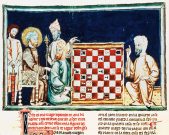The Complicated Political History of Mideast Christians
In my first post, I described the terrible conditions facing Mideast Christians today. I’d now like to explore the reasons for their current situation—which are many. To do so, though, I’ll have to step back to introduce these Christians, since most Americans know relatively little about them. I’ll also have to say a bit about their history since the Muslim conquests of the first millennium.
Most Mideast Christians belong to ancient communions which date from the founding of the faith. Most have been separated from Western churches, and from each other, for many centuries. Although the separations initially occurred over points of doctrine—sometimes quite recondite points of doctrine, by today’s lights—they were greatly influenced by culture and politics as well. The doctrinal differences have receded into the background for most people, especially for Mideast Christians themselves. There is much intermarriage and it is rare to hear churches formally criticize each other’s Christology, for example. But the cultural and political differences with the West remain; even today, Western Christians tend to see these groups as foreign and obscure—which is a pity, as they often have preserved very early traditions of the faith.
The first large group of Mideast Christians are the Oriental Orthodox, who separated from the West in the first major schism in Christianity, after the Council of Chalcedon in the fifth century: the Armenian, Coptic, and Syriac Orthodox Churches. The second are the more familiar Eastern Orthodox, which trace their heritage to the imperial church of Byzantium, and which separated from the West about 1000 years ago, in the Great Schism. In the Mideast, the Eastern Orthodox are mostly Arab-speaking Greek Orthodox Christians, whose patriarchate in Antioch has done much missionary work in the United States.
There are also Catholics. Predominantly, these are Eastern-rite Catholics, like the Chaldean, Maronite and Melkite Catholics, who use different liturgies from Catholics in the West. There are Latin-rite Catholics in the Mideast as well, though, like the Franciscans at the Church of the Holy Sepulcher in Jerusalem. There are also smaller Christian communions, like the Assyrian Church of the East, which separated from the main body of Christianity in the fourth century, and which prevails in parts of Iraq. Finally, there is a small number of Evangelicals, a new addition to the Mideast, historically speaking.
For 12 to 14 centuries, the central fact of life for Mideast Christians has been adapting to Muslim-dominated societies. In classical Islamic law, Christians (and Jews) were tolerated as “People of the Book”—the recipients of an older, though from the Muslim perspective incomplete, revelation. Christians were allowed to live in Muslim society as long as they accepted the terms of the dhimma, a notional contract between them and the Muslim nation, or Umma. Christians were required to pay a poll tax called the jizya and to accept a subordinate place in society. In return, the Umma protected Christians from private violence and allowed them to worship more or less as they saw fit—as long as Christians did not proselytize among Muslims or insult Islam in any way.
The rules were not always fully observed in all places, and individual Christians could rise in classical Muslim society. For long periods, even, they could live in relative peace—though always in a state of insecurity. Periodically, though, Christians were subjected to violent persecution, for example, when they seemed to forget their place and assert equality with Muslims, or when they seemed to cooperate with Muslims’ outside enemies, especially Christians from the West.
The classical rules have not formally been in effect in the Mideast (with some exceptions) for at least 150 years, ever since the Ottoman Empire adopted Western-instigated reforms in the nineteenth century. Few Muslims would like to see the rules return; ISIS’s reinstatement of the dhimma in the parts of Syria and Iraq it controls is without precedent in modern times. And yet, the dhimmi restrictions and the attitudes they promote remain relevant for Mideast Christians today. I’ll take up that matter in my next post.

